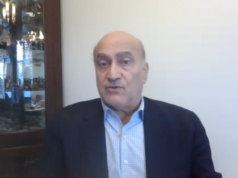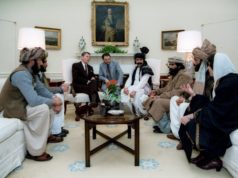Imran Khan, the leader of Pakistan’s largest opposition party, pulled out of talks with Prime Minister Nawaz Sharif on Wednesday, calling on him to resign. Khan’s actions set the stage for continued political turmoil as thousands of anti-government activists gathered outside government buildings in Islamabad.
Each side blamed the other for the breakdown of talks meant to resolve allegations of fraud during elections in May 2013. Khan’s party, Tehreek-e-Insaf (PTI), said that it has exhausted all its political options to contest the poll and is now calling for mass civil disobedience. Sharif, on the other hand, suggested establishing a judicial commission to investigate the alleged vote rigging.

Supporters of opposition politician Imran Khan take part in a demonstration in Gujranwala, Pakistan on August 15, 2014. |
Meanwhile, opposition protesters who had been camping out since last Friday, entered the secured “Red Zone” in Pakistan’s capital. Ralliers armed with sticks and wire cutters confronted the army as they attempted to encircle Parliament and the Prime Minster’s office. Thirty-thousand additional security guards had been deployed to protect the administrative area, which includes the U.S. Embassy, according to the government. However, the army disputed the figure saying only about 700 additional troops were guarding important buildings.
But the basis of the PTI’s protest, alleged widespread irregularities during last year’s landslide victory for Sharif, is not supported by independent observers. Rather, “Mr. Khan lacks a certain basic level of respect for the umpire,” says The Economist, echoing the sports metaphors used by the former cricketer in his stump speeches.
Even without broad political support, Khan’s aggressive posturing this week worries Western officials. With the military out on the streets of the capital, the army could play a decisive role in ending the turmoil. If protesters are able to occupy government buildings without intervention from the Pakistan’s top military officials, the army could be seen as complicit in a de facto coup. Indeed, the powerful military establishment has not been happy with the Prime Minister. Sharif has sought to check the power of top generals who overthrew his elected government in 1999 and has long meddled in the affairs of civilian leaders.





